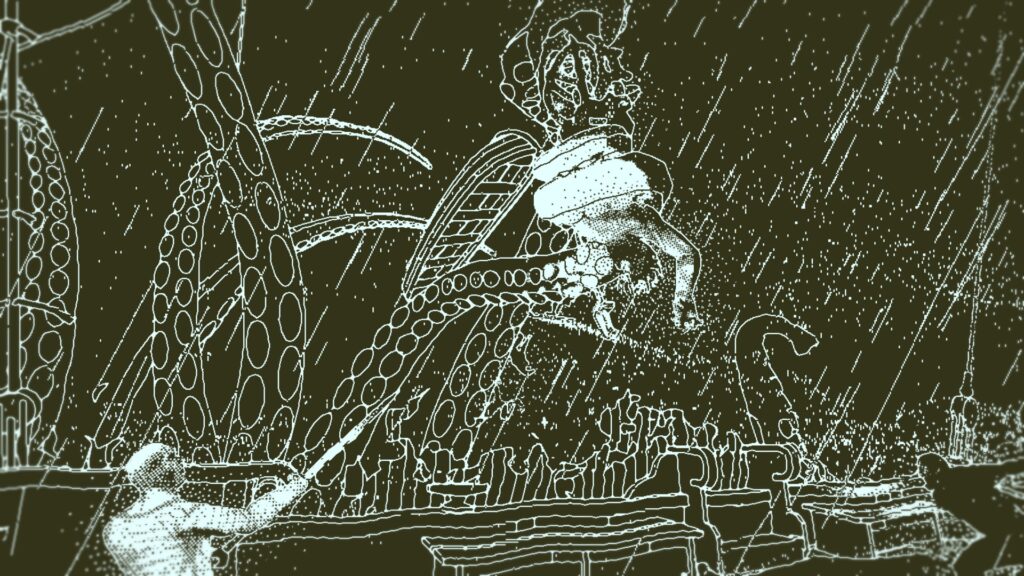Welcome back readers.
First order of business today–I’m plugging the Patreon, and will be doing so more regularly going forward. We are a directly reader-supported operation. That support is what allows us to highlight cool and interesting games writing year-round, produce monthly and yearly recaps, organize fun community events, commission critical compilations, and keep the website up and running! Right now our intake is a little tight and not quite enough do be doing all the things we’d like to be doing (i.e. video curation!). If you’ve got a few bucks to spare and you appreciate what we do, consider helping us out!
Additionally, if you still haven’t done so, go see Kaile’s ginormous year-in-review issue! If you want to add to our reading list with your own recommendations, come hang out with us on our Discord.
This Week in Videogame Blogging is a roundup highlighting the most important critical writing on games from the past seven days.
Interviews
This week we start with interviews from independent developers on topics ranging from sustainability to elevating Palestinian voices.
- Indies Are Pushing the Video Games Industry Forward, but at What Cost? | Rolling Stone
Hayes Madsen talks to indie developers about the challenges of production, funding, sustainability, and more. - ‘Talking about the Palestinian story was forbidden’: a developer’s struggle to make a game about the 1948 Nakba | The Guardian
Keza MacDonald talks to Palestinian developer Rasheed Abueideh about his game Dreams on a Pillow (Further Reading – Hippolyte Caubet’s video on the commercial games industry’s complicity in the dehumanization of Palestinian and Arab communities).
““The goal is to let the player feel and understand what happened to the Palestinians during this dark era, which is still shaping our daily lives,” says Abueideh. “I want to deliver a message that the ethnic cleansing of Palestinians is an ongoing process that started in 1948. At that point, [players] will be able to understand what is happening today and can take a stand.””
Retrograde
Next up we’re collecting different conversations on “retro”–be it the commercialization of nostalgia, gatekeeping, or “lateral thinking with withered technology”.
- I don’t like retro gaming | Kimimi The Game-Eating She-Monster
Kimimi makes the case that “retro” is a useless and arbitrary distinction. - The Playdate Represents the Best Future for Handheld Consoles | Unwinnable
Luis Aguasvivas highlights the palmable platform with an accessible SDK and an eclectic and absolutely stacked library. - The Price of Nostalgia | Inner Spiral
Alli meditates on exploitative nostalgia in the retro games hobby and the counter-movements–emulation, piracy, preservation–that resist that exploitation (Further Reading – Crushed’s post on planned media obsolescence).
“Reclaiming nostalgia isn’t just about saving money, it’s about saving culture. It’s about ensuring that the joy of gaming remains a shared experience, not a privilege for the few. Supporting preservation initiatives, like the Video Game History Foundation and the Internet Archive, open-source emulation projects, and communities is a start. These efforts don’t just safeguard games; they preserve the stories, contexts, and connections tied to them. These organizations remind us that the past isn’t a product to be owned but a legacy to be shared and understood.”
Critical Consciousness
Our next section looks at power structures–ideological, racial, capital–in and out of the industry.
- The Procedural Unconscious | ROMchip
Patrick Jagoda and Ashlyn Sparrow unpack the many spectres–allegorical, algorithmic, racial, capitalistic–haunting Return of the Obra Dinn. - Ruin and Renewal: On Civilization V, Fascism, and the 2024 Election | Gamers with Glasses
Alexander B Joy channels Civ V and José Ortega y Gasset to understand the self-defeating contradictions of fascism in the US and to lay the groundwork for uprooting and replacing it (Further Reading – Prior writings in this conversation from GwG, Kaile, and Kastel).
“Like Ursula K. Le Guin observed, “Any human power can be resisted and changed by human beings.” What Civilization V understands is that deep societal discontent cannot long be ignored. No matter what form your government assumes, failing to deliver good governance has consequences. The governed can, and will, revoke their consent.”
Art and Craft
Here we’ve got some thoughts on character writing and artistic identity.
- Character Constraints | Ada Play
Adarel contemplates how internal and external character constraints mesh with interactive and emergent narratives. - Same as It Ever Was: Narrative Fidelity and the Art of the Remake | Unwinnable
Emma Kostopolus ponders the artistic identity of remakes through the language of myth (Further Reading – Perry Gottschalk on remakes as an opportunity to do something different).
“The point of art, such as it is, seems to be to make something that only the creator could do, something that could only be the product of their ego. And if it’s not that, we call them hacks. Except, apparently, when they remake a videogame we like.”
Critical Chaser
This one was posted a year ago but I couldn’t not.
- gacube emeleter | Insane Rambles About Technology
Have you ever wanted to emelate a nintendo gacube on your 3ds? Yeah me neither.
“Most of the things Peter asked for eventually came true. The 3DS can now be hacked on all firmwares, including, should one desire, the ability to downgrade from an 11.0+ firmware.
The gacube emeleter, however, was never finished. And it was, and still is, the “devs obofihation“
We, the devs, are obligated. Let’s make it happen.“
Subscribe
Critical Distance is community-supported. Our readers support us from as little as one dollar a month. Would you consider joining them?
Contribute
Have you read, seen, heard or otherwise experienced something new that made you think about games differently? Send it in!


